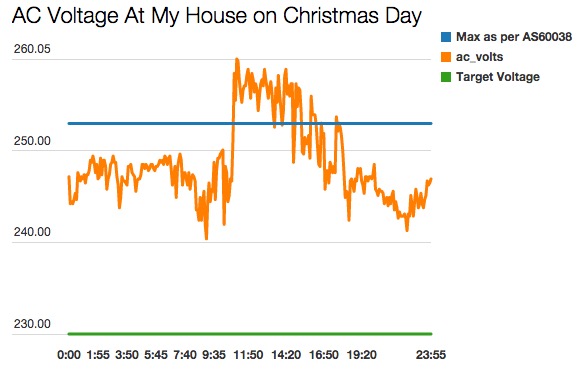I’m getting reports that lots of solar owners in Adelaide have seen their inverters shut down over Christmas.
No, the inverters are not taking a break to eat mince pies and open their presents – they are shutting down because the grid voltage seems to be regularly going higher than 257V. Many inverters are designed to shut down when the grid gets this high, in order to protect the inverter electronics.
According to the Australian Standard (AS 60038-2012), the grid should be kept at 230V -6% / + 10%. So the highest it should get is 253V.
Unfortunately SA Power Networks seem to be particularly bad at controlling the voltages in their network, and it is not unheard of to see the voltage get up to 263V at your local Stobie Pole.
Why? I’m not sure, but the massive amount of wind power coupled with lots of industry being shut down for Christmas might have something to do with it.
The graph above shows the grid voltage logged at my house in southern Adelaide over Christmas day. As you can see, the voltage never gets anywhere near the target of 230V, and jumps over 260V just before midday where it stays for hours.
If I had a conventional inverter, it may have shut down. Luckily I have microinverters which are a little more tolerant of high AC voltages.
But where they do cause a problem is in equipment reliability and efficiency. Electrical equipment is designed to operate with optimum efficiency at 230V (50Hz). I’ve also noticed that electrical equipment does have a high mortality rate in my street.
So come on SA Power Networks, how about spending some of your massive profits on some decent voltage regulation equipment?


 RSS - Posts
RSS - Posts



LOL, Well everybody that are ‘ owners of Solar panel systems ‘ my I say,
” Welcome to the real world of UNREGULATED power authority’s of AUSTRALIA ! ”
For it cost money to regulate the H/V trannies around the country of ours we live in. And thus to the reasoning of its not being done anymore !
# Even a electrical contractor that advising them of these problems are ignored, or treated with nasty contempt by them too !
As the standard maximum should be no more ensured, so start UNPLUGGING YOUR APPLICANCES WILL BE NEXT TO GO and need a dump holiday !!!
i recall SA Power being in the news not long ago for some other underhanded doings. Seems to be something of a trend developing down there.
I have an idea, you get those solar panel owners to form a collective to put some money together to threaten SA Power networks, that if only one of those customers’ solar inverters is damaged by that over voltage, that you will threaten them with a class action…now they, SA Power, have two choices, they can either resolve the situation by looking into why the voltages are over and above what they should be, fix the problem and make everyone happy, …or…they can suffer bad publicity from the fallout from a class action court case. Just the news that some people threaten with a class action pushes big companies to the limits and after they finally find out they are in the wrong…it costs them double to get everything back to normal publicity wise, than it would have if they had sorted the original problem out in the first place…no longer are companies as big as they think they are when the ‘little people’ gang up against them. If, as you suggest you think the extra voltage was intended for damage..then the solar panel owners might have a case. Tread carefully…but I like David versus Goliath cases, especially when I get a feeling David is going to win hands down…hehe. But before all that starts, you give SA Power the benefit of the doubt to attempt to sort the problem out…if they don’t intend to even send someone out to check the current problem with the inverters…then maybe it might be prudent to take legal action..I am not a legal eagle…just a realist. Message to large companies: Might is not always right.
The federal government having scrapped the carbon tax are subsidising solar in order to reach the carbon reduction. The States are paying the price for this and thus doing everrything possible for people not to go solar. There is an obvious fight between stage and the feds. Most power companies are state owned, here in Queensland, both Ergon and Energex are both fully owened state enterprises. When you go solar the state loses out on revenue and hence has to increase the kwh rates…. there will be a screaming from people in rented houses and people living in units. People in their own houses can do something about it by having a stand alone system with a change ower switch to the grid, i.e. only use the grid in need, otherwise use batteries for the extra power generated, don’t sell any power to the grid,,, put the panels on your shed or outdoor toilet or where ever you want them,,, don’t bother applying for grid connection. Suggestion: use micro inverters,
simulate the trid, use all your own power and when you have a surplus, dumpt it into batteries for night time use,,, and when your batterries drop to 50% capacity, swithc to the grid. Why sell power for 8 cents kwh and buy it back for 4 times that?
How big is your system and have you done your voltage rise calculation correctly (and have your neighbours done their’s correctly)?
Grid voltages don’t generally jump suddenly. However the sun can suddenly come out in your local area. The graph you’ve posted doesn’t look like a grid issue. If you have a big system and you (or your neighbours) didn’t do their calculations correctly that can easily push your local voltage up.
If your inverters aren’t shutting down at high voltages they don’t sound like they’re compliant either. They don’t shut down to “protect the inverter electronics”, they shut down to prevent exactly this situation. That’s why AS4777 exists. Part 3 section 5.1 refers to “Grid Protection” not “Inverter Protection”.
If you feel you’ve got an actual issue you can ask the distributor to investigate. They may just adjust the Tx down or they may determine that you’re the problem and issue you with a rectification order and/or isolate your solar system until it is compliant.
Hi Jason,
Thanks for the comment.
It is 6kW and I live in SA so I don’t have to do a voltage rise calculation (which is pointless IMHO – what’s a 1% rise when the grid is so far from 230V without solar it is not funny).
Here’s the grid voltage midnight to 7am this morning. Something tells me that it was not my solar system that caused it to get within a bee’s dick of 253V at 5am!
Cheers,
Finn
Over voltage is a serious issue for all power consumers as the higher voltage puts additional stress on electrical and electronic equipment and motors. On top of that, over voltage will trip out many solar inverters. I have two installed, and one trips out frequently. My line voltage is over 253 volts most of the time and I have written to SA Power Networks to ask what they are going to do about it. Just three days ago, I reported an over voltage of 258 volts and the guys who came to investigate told me it was my solar inverter causing the problem which is absolute rubbish. Solar inverters are designed to follow the line voltage exactly and push current pulses into the network, they cannot increase line voltage. Many solar PV owners blame their inverters when they shut down and are unaware that the problem is caused by over voltage.
I think I’m experiencing this too. Plugging an el cheapo monitor into my wall socket, I get 247V at 7AM. By the time it’s midday, my inverter is at 251-253V which anything over 250 causes power reduction. Not hitting shutdown volts yet but the 6.6KW system is performing at around 4-4.2 peak on a clear cool sunny day, which is disappointing. I get better performance in much higher temps due to running my A/C and others on the street also doing that and slightly bringing the voltage down.
Being under the SAPN limits, I doubt they’d even lift a finger.
Just put in a 6.6kW system with 5kWhr inverter. Meter being changed as I type.
Just discovered that for 8.5hrs yesterday that my voltage was over 253V (logging every 5mins using my UPS). Most of it at 260.6V. Also the contractor installing meter says that the 16mm2 underground conductor running 85m to the shed will not be sufficient for the system (in his opinion). All I got from the solar company (I wont name them until I confirm everything..) was a test of 3.5kWhr on the inverter display briefly – cloud day when they installed it last week.
I am thinking about uninstalling the panels to recoup lost money……
Hello Caleb
If you have a 5 kilowatt inverter on an 85m cable with 16 square millimetre diameter that will result in more than 2% voltage rise and so will not meet Australian standards. The maximum distance that cable can cover and only cause a 1% voltage rise is 38m. If you have a 3 phase power with a 3 phase inverter it would be fine, but that is unlikely.
Your installer is required to either bring the system up to standard or, if they can’t or won’t do that, remove the system and restore your roof to the way it was and return all that you paid. If they don’t take action I recommend contacting consumer affairs in your state.
The grid over voltage is another issue and Finn has written a step by step guide covering what can be done on that:
https://support.solarquotes.com.au/hc/en-us/articles/115001759153-My-Inverter-Keeps-Tripping-or-Reducing-Power-On-Over-voltage-What-can-I-do-